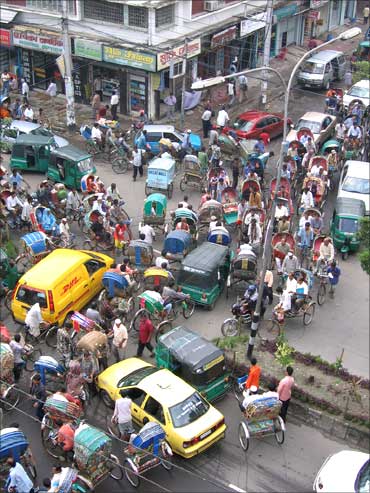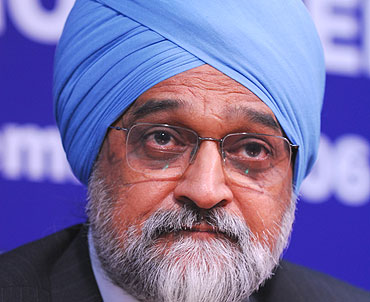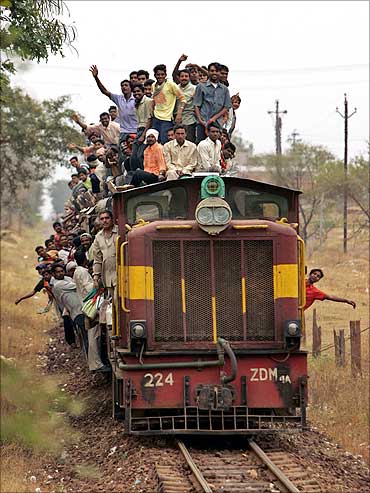Image: School girls perform during celebrations to mark India's Independence Day.
Photographs: Ajay Verma/Reuters. T N Ninan
Photographs: Ajay Verma/Reuters. T N Ninan
The chief executive of a global corporation once said that whenever they had bet on Indian people, they had been proved right, but whenever they had bet on the Indian market, they had been proved wrong. He said some years later that even the Indian market was proving a good bet, but that betting on the government was still not a good idea. Twenty years after the launch of the economic reform programme, that remains as good a summing up as any.
Why the next decade will belong to INDIA
Image: An Indian policeman performs a stunt during the Republic Day celebrations in Jammu.Photographs: Mukesh Gupta/Reuters.
The Indian people (more correctly, large sections of the total) have flourished - as managers and workers in enterprises, at home and abroad; as entrepreneurs themselves, again, at home and abroad; and as consumers for whom the reforms have brought manifold benefits.
And the Indian market has grown like never before.
Why the next decade will belong to INDIA
Image: An employee works on a wiring section of a vehicle at the factory of Samvardhana Motherson Group.Photographs: Reuters.
Many product and service markets have grown tenfold and more in the last two decades, product quality is usually unrecognisable when compared to what was on offer in 1991, and prices in relation to salaries have fallen in most cases, making goods and services far more affordable.
Why the next decade will belong to INDIA
Image: Gaurav Sharma, a martial arts trainer, climbs the 45 storey 'Shreepati Arcade' in Mumbai.Photographs: Arko Datta/Reuters.
The solitary exception would probably be housing, which remains an area of soaring costs. Most people have tended to ignore these seminal changes when considering the crisis-ridden environment today, when neither an attack on large-scale and brazen corruption, nor further reform, nor improvement in governance standards, appears to be a realistic expectation.
Why the next decade will belong to INDIA
Image: Literacy rate has risen.
The result is an atmosphere of doubt, as to how long the Indian growth miracle can be sustained, and whether the disjuncture between the assumed requirements of successful politics and sensible economics can be fixed.
But is a more hopeful narrative possible?
For instance, despite all the failures on the education front, the fact is that literacy has climbed in the last two decades from 52 per cent to 74 per cent.
Why the next decade will belong to INDIA
Image: Reuters.
The opportunities for secondary and higher, including professional, education have improved dramatically. Heedless of the accepted wisdom that agriculture has been running out of steam, agricultural growth has revived and been better than three per cent on average for the past several years.
Why the next decade will belong to INDIA
Image: Healthcare shows steady improvement.
Despite the manifest failures in public health, the major indices (maternity and child health, immunisation levels, etc) show steady improvement. So, in key areas of activity dominated by the government, the situation now is much better than before.
Why the next decade will belong to INDIA
Image: Dhaka.
Admittedly, Bangladesh has done better on some of these issues, just as China has done better on growth. But that is no reason to believe that nothing has been or can be achieved here in India, by the government.Is there an agenda waiting to be addressed? Of course there is.
Why the next decade will belong to INDIA
Image: Montek Singh Ahluwalia.
The deputy chairman of the Planning Commission, Montek Singh Ahluwalia, has written an extended article in Economic and Political Weekly recently, laying out a long list of issues that need to be addressed if the 12th Five-Year Plan (starting next April) is to achieve its nine-plus per cent growth target.
Why the next decade will belong to INDIA
Image: Dal Lake.
It might be a good idea to bullet-point the issues and set specific goals and timelines, so that continuous monitoring and mid-course correction are possible. The government should be addressing issues in such a comprehensive and focused fashion if faith in its ability to deliver is to be restored. The world has just witnessed the passage of two decades that have belonged to China, with India getting honourable mention in the dispatches.
Why the next decade will belong to INDIA
Image: Villagers travel by train on the outskirts of Raipur.Photographs: Kamal Kishore/Reuters.
The coming decade could finally be India's, as China ages and its working population stagnates, and as a corollary its savings (and therefore investment) rate drops - all of it translating into slower growth.
But if India is to fulfil its destiny, the government has to snap out of its stupor and get down to business.













article